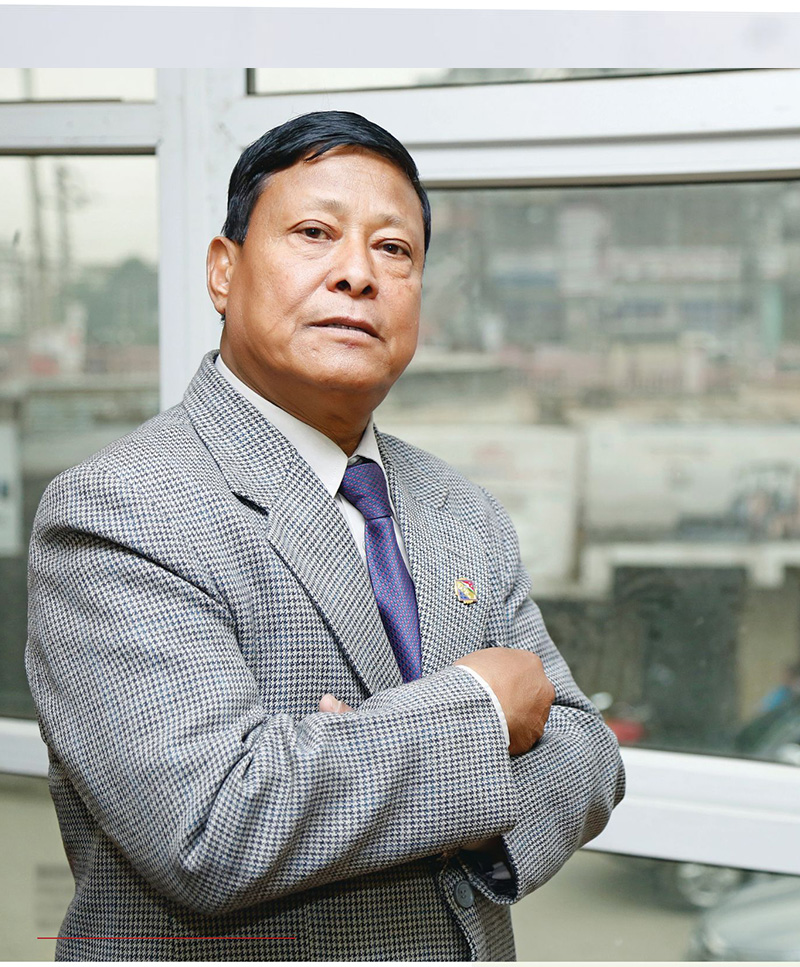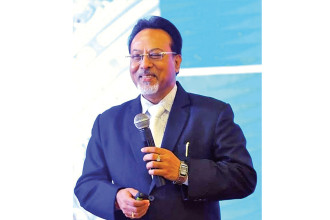
Bishnu Bhai Shrestha is the President of the Federation of Contractors Associations of Nepal (FCAN). He was the Senior Vice-President prior to this. He took over chair of President after the tragic demise of its then President Sharad Kumar Gauchan. On May 25-26, FCAN will host its 20th Annual General Meeting where it will get its elected President.
In this edition of Business 360, Shrestha shares with us the role and responsibilities of FCAN and an overview of the sector. Excerpts:
Tell us about Nepal’s membership into International Federation of Asian and Western Pacific Contractors’ Associations (IFAWPCA). How does the association with IFAWPCA benefit Nepal and Nepali contractors?
It is the fraternity of builders in 19 countries and Nepal is a member. We participate in conventions and events hosted by IFAWPCA. There is exchange of ideas, experiences, and construction and engineering technology amongst its members. IFAWPCA promotes international fellowship and cooperation.
Would you clarify the roles and responsibilities of FCAN especially for the benefit of those who doubt its relevance?
It is an umbrella organisation of all the contractors in Nepal. Its main role is the development of the sector, finding solutions to the plight of contractors spread across the country, to make tendering accessible to everyone at the national level, correct existing errors, introduce new technology, and take the country to an international level making Nepal economically stable.
It was reported that FCAN would host its 20th AGM within mid-March, what happened?
We have shifted it to May 25 and 26. The election of FCAN President will take place during the same occasion. The agenda for the AGM has not been fixed yet but we are in the process of preparing one. However, since the country is federal; we have to federalise FCAN as well. We have to make our presence felt in every province. We have already established seven provincial associations. We now have to prepare our legislation and register the seven provincial associations.With this in place, we will go in the election.
Has FCAN internalised federalisation and how will it function in the federal system?
We have yet to understand the concept of federalisation in its entirety. Everyone is still in limbo regarding it since things are not clear yet. We have identified provinces but we have yet to chart out the workings of provinces, how the concept of province will move forward, what the province will do and what are the responsibilities of the center is not yet clearly stated. How many tenders will the province release and how many are released by the center is also not defined. Besides, the budget has not been released to the province. Things have not been systematised. At the country level also our provinces have been slowly established, but they have yet to be institutionalised.
The activities of the 77 districts will first go to the province. Every province has its own rules, regulations, policies and legislation. The workings of the center and the provinces will be decided after discussions.
Could you shed light on FCAN’s equation with the government?
The government is not our benefactor. We function like an NGO. FCAN procures help from donors, membership renewal fee from construction entrepreneurs, and aid to keep up with the administrative functions. If honesty is demanded, the government has not provided any aid to us whatsoever. However, GoN has recognised us. We are invited at various functions and events to participate which is a stamp of our existence. Nevertheless, the acknowledgement is, in fact, done half-heartedly. When there is absolute recognition on part of the government, FCAN can then come up with proper guidelines and legislation. Whatever guidelines are given to us by the government are not complete. Since they are not complete, FCAN has not been able to perform its duties properly. That is also the reason why the federation finds itself at loss at times. It has yet to achieve its footing. But hopefully, we will get complete recognition in the near future.
The delegation led by you briefed then Minister of Finance Gyanendra Bahadur Karki and also Maheshwar Neupane, Secretary of Public Procurement Monitoring Office (PPMO) about price hikes in construction materials. What was the outcome?
There has not been any outcome as such. We are still meeting with government officials and discussing matters with them. In case of large construction companies, a cushion is provided so that they do not suffer from the setback. However, projects whose life is less than 12 months do not enjoy such provisions. GoN reckons these are short life projects and therefore should not be subjected to any facilities. Small construction entrepreneurs suffer the most due to dubious price hike in construction materials—more than Rs. 200 on a bag of cement, and more than Rs. 20 on a kg of rod.
‘Dubious’ meaning they have increased prices stating hike in the price of clinker. But 30% clinker is imported from India and 70% is from Nepal. So only a tad bit increase can be acceptable. But the price of cement is increased on the argument that 100% clinker price has been increased. This is improbable and they should not have done that. Also in rods, fluctuation in the value of dollar was witnessed, therefore price hike can be considered but the hike was overpriced. Government should have monitored all this. Because of the negligence on part of the government, the construction and development sectors are suffering significantly.
Everyone’s hope rests with FCAN to help them out of this precarious situation. The hike should be corrected or concession should be provided. An excerpt of Clause 55 (1) of the Public Procurement Act 2063 BS reads: If the price of any construction materials is suddenly increased or decreased by more than 10%, price shall be adjusted by deducting 10% in the amount increased or decreased. It was once implemented in 2008. We have been stressing on the implementation of the same legal provision. We have been receiving assurance from all fronts. If our request is not heard, we will suffer a great loss.
It is reported that the construction industry contributes 11% to the country’s GDP. Is that correct?
In fact, it is more than 11%. We have not done a country wide survey, but it should be between 11-14%. It is the second largest employment generating sector after agriculture. It provides employment to 14-15 lakhs people.
After the murder of then Chairman Sharad Kumar Gauchan, FCAN has been pressing the government to immediately bring into effect mechanisms to safeguard construction entrepreneurs in the country. What are the vulnerabilities?
Except for one or two, almost all the perpetrators involved in the case are behind bars. But those on the loose have not stopped sending us threatening messages. Moreover, goons still demand money from us. Government has assured us protection. However, we are in the process of requesting the government for security assurance of a different nature. Government cannot avail us security like that provided to ministers, we rather want a permanent solution. Those who can afford it should hire bodyguards.
Why is the Construction Entrepreneurs Fund (CEF) set up in 1999 to assist in the capacity building of contractors defunct?
The fund has not been functioning well. It was created for the promotion, capacity-building and professional development of construction entrepreneurs in Nepal in the areas of tendering process, tender form fill up, engineering skills, use of construction equipment and developing competence. In 1999 when CEF was formed, the construction industry did not enjoy the magnanimity that it boasts of today. It was not as big. The fund was established with the concept that FCAN will contribute a certain percentage and the government will deposit the same percentage to the fund, however, it was not properly implemented by either side. When it was introduced, it was done so with the best intention. Irony is we could not utilise it effectively.
FCAN hosts Excellence Awards among Class A, B, C and D contractors. What are the criterias for winning the award?
The contractors who excel in different areas such as complete projects on time or perform quality work are considered for the awards. The annual awards are to promote them to continue with the excellent work and achieve greater heights. However, we are also discussing the possibility of hosting the award every alternate year given the enormity of the groundwork. We started the awards in 2008. Last year we could not host the awards because of the general elections in the country. All the necessary groundwork for this year’s awards has been completed. There is a separate committee of judges for the purpose. The event should be conducted before the AGM scheduled for late May.
Many contractors accuse the government of playing on their weakness in the bidding process thereby putting Nepali contractors at a disadvantage and favouring international contractors. Your comments.
We believe that Nepali contractors should be benefitting from government offers. In fact, we are capable of handling any mega project. Having said that, the only area we lack could be in technical aspects. If a mega project is out of the competence and expertise and caliber of Nepali contractors, only then should it be outsourced. Our request is that due training should be given, competence should be built. Train the Nepali manpower.
As much possible, Nepali contractors should be leading mega projects. Also the money will remain within the country that way. Our argument is that instead of commissioning foreign contractors to manage a project, we should be given the opportunity. We can manage a project effectively and efficiently as well. In the case of construction of tunnels, hydropower projects and dams, Nepalis are not as competent but what can be done is to break a big project into small parts and handover some sections to Nepalis. We should only import the technology.
What are your plans for FCAN if you get elected as its President?
Unexpected circumstances forced me to take up the role of President. It has been almost six months that I have been bearing responsibilities of the supreme authority at the federation. I will make full utilisation of my collective experiences as Senior Vice President and that of the President. Blame is always put on Nepali contractors for the dire condition of the construction sector in the country. I will come up with plans to upgrade the competence of Nepali builders. I will work with the government in the introduction of rules, regulations, policies for the construction industry. Every guideline should be stated clearly. No one should suffer. The chaotic condition of the tendering process needs to be revisited and refurbished. Whether the blame is on the part of the government officials or the contractors, wrong doers must be penalised. Nepalis should be given the opportunity to build Nepal.






